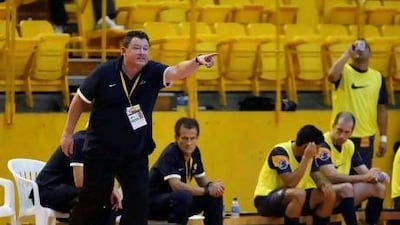Steven Knight fondly remembers the days when futsal enjoyed a significant position in Australian sports. His country hosted the second Futsal World Cup in 1988, and Knight was a member of a home side that beat Italy and Hungary in the group stages, and prevailed over Argentina to finish sixth.
"Back in 1985, Australia had a strong national league and I played in two Futsal World Cups," said Knight, the coach of the Australia team who are in the UAE for the AFC Futsal Championship. "We ranked as low as sixth and we had good results against Italy and Argentina."
Growing up with the dream of playing for Leeds United in the English Premier League someday, Knight had later switched to the five-a-side game and considers himself fortunate to have played in that era.
Futsal in Australia was privately managed in those days, but the top football stars turned up for the five-a-side game as well. However, after Fifa took control of the sport and the rest of the futsal world moved on with its development and became more professional, Australia's development became stagnant, mainly due to a lack of funding and internal politics.
"The organiser of the sport was a private individual back then," Knight said. "It was a chap that was out of the YMCAs in Sydney. We had good ideas to promote it, but he didn't want to release control.
"Between 1985 and 1992, the players that were playing at the top level outdoors also played at the top level of futsal because our football season is short.
"Since 1992, because it wasn't televised, most of the players decided not to play. They lost interest."
Around 2006, the Football Federation Australia took over the administration of futsal in the country, but Knight said the sport suffers from a sort of step-brotherly treatment.
"Most of the money in Australian football goes to football, not the futsal department," he said. "Probably, there is a lack of understanding how futsal can be an aid in football development.
"Unfortunately, until we find that solution in the development of football through futsal, there won't be sufficient amounts of money to provide the futsal team with sufficient funding."
Many football commentators in Australia have been pleading with their football federation to recognise the obvious benefits of futsal as a development tool, but change has been slow in coming.
The late Johnny Warren, known as Captain Socceroo for his passionate work to promote football in Australia, was one of them, and more recently, Les Murray, host of The World Game and a football pundit, wrote: "The indoor game continues to be sidelined, like some insignificant cousin, its critical importance ignored to football's utter detriment."
The lack of funding made it difficult for Knight to pick his squad for this championship and prepare them.
"I think there is a total of between 30 or 40 hours of preparation over seven weeks," he said. "One reason is due to the funding and then the other reason is due to the fact that the players are purely amateur.
"Because the club structure is not strong, some players maybe train one night, maybe train two nights or maybe not train at all.
"So the difficulty has been to select a good balance of workmen and skilful players. We have been fortunate to use a couple of the most skilful players, but they only joined the team the day before we left."
Preparing for the tournament, Knight would train his squad Wednesdays and Sundays in Sydney. Players from other states had to pay for their own flights into the city for the training.
"I don't work full-time for the federation and I don't get paid for the coaching here," Knight said. "We don't receive payment. The players don't receive payments.
"Some of the players work in construction, some of the players work in offices. It becomes difficult to try and get the whole squad together at any one time."
Despite those problems, Australia have managed to qualify for the quarter-finals of the AFC Futsal Championship from a group that includes Iran, the 10-time champions, South Korea and well-funded Qatar.
Now, Knight is hoping they can overcome Kuwait tomorrow and reach the semi-finals. That would assure Australia a place in November's Futsal World Cup in Thailand.
"If we are able to qualify then there might be more notice," he said. "But the problem with the football coaches in Australia is that they are not seeing futsal as a development tool. They don't understand its benefits and they feel threatened by the game.
"So unless you see futsal from Brazil, Spain, Italy or Iran and the development stages in those countries, you won't have an understanding of how it helps.
"And this is the problem.
"If we don't change that attitude, we will probably go two steps up and three steps back."
Follow us

